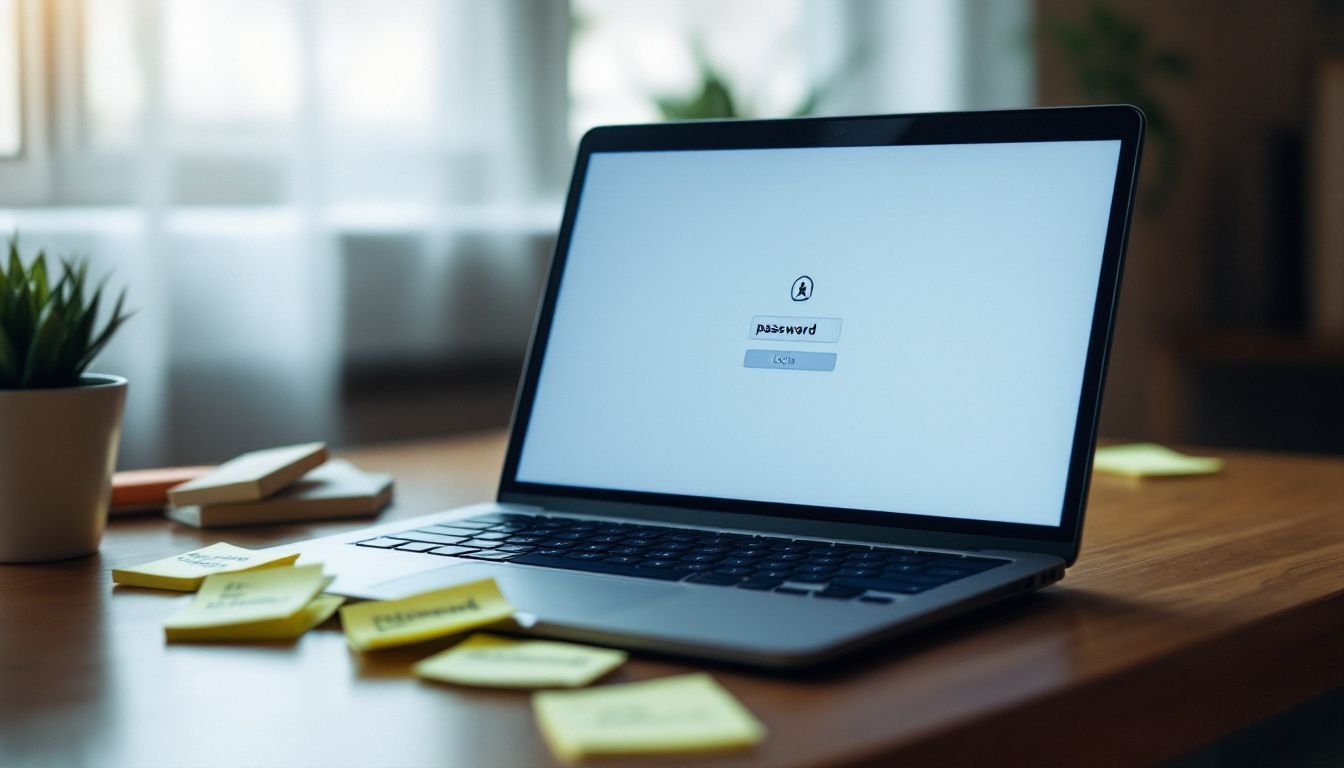You might think your social media and email are safe. But, hackers are always finding new ways to break in. A recent rise in credit card data breaches has shown how easy it is for thieves to steal identities through the web.
This makes updating your passwords more important than ever.
One key fact stands out: people often forget to change their passwords after a security scare. This article will show you why you need to update your social media and email passwords today.
We’ll cover how this simple step can keep you safer online. Ready to secure your digital life? Let’s start now.
The Necessity of Updating Your Social Media and Email Passwords

Changing your social media and email passwords is key to keeping your online life safe. It stops hackers from getting into your accounts and stealing your personal info.
Understand the Risks of Identity Theft
Identity theft happens when someone takes your personal information and pretends to be you. They might use this info to buy things, get new credit cards, or even take your tax refund.
The recent incident with Target in Winter 2023 showed how big this problem can get. Thousands of people had their credit card details stolen. This kind of crime is growing because the bad guys can make a lot of money from it.
A study called “Markets for Cybercrime Tools and Stolen Data” says that stolen identity info is worth more now than before.
Hackers have many ways to steal your data. They could trick you into giving them your password through phishing emails, hack into businesses like online stores or social media sites where you shop or chat, or they might use software that guesses weak passwords until they get it right.
Once they have access to one account, and if you use the same password on other sites, they can easily break into those accounts too. This is why changing your passwords regularly and making them strong is very important for keeping your personal information safe.
Assess the Growing Threat of Stolen Digital Information
Stolen digital information is a big problem that keeps getting worse. Thieves want your social media and email info because it’s worth a lot on the dark side of the internet. They use tricks like phishing or hacks to get into your accounts.
Once they have your details, they can pretend to be you. This can hurt you in many ways, from losing money to damage to your reputation.
I learned this the hard way when my own email was hacked. Suddenly, I couldn’t access any of my accounts linked to that email. It took weeks and lots of help from experts in online protection before I got back control.
This scary experience showed me why updating passwords often is so important for keeping private info safe.
The Overlooked Practice of Regular Password Updates
Changing your passwords for social media and email is something people often forget. It’s important but doesn’t get enough attention. This practice is key to keeping your online life safe.
You see, when you don’t update your passwords regularly, hackers find it easier to break into your accounts. Think about it like locking your front door: if you never change the lock, someone might figure out how to get in.
Tools like password managers make regular updates simpler. These apps store all of your passwords in one safe place. They can also create strong new passwords for you that are hard for cybercriminals to guess.
This means less work for you and more trouble for anyone trying to sneak into your private accounts. Plus, using different tough-to-crack passwords for each site boosts your defenses against attacks even more.
The Dangers of Using Similar Passwords Across Platforms
Using the same passwords for your Facebook, email, and online retailer accounts can be a big risk. If one account gets hacked, all of them could be next. Hackers use stolen passwords from one site to break into others.
This method is simple for them but dangerous for you.
I learned this the hard way when my social media and email got hacked on the same day. It was because I used the same password for both. The hacker accessed my personal information and it took weeks to fix everything.
Now, I make sure each password is unique and strong.
One weak password can compromise all your accounts.
Key Security Concerns to Consider
Key security worries are something you must think about. With dangers like the Heartbleed Bug, it’s a big deal. You need to look at your most important accounts now and make sure they’re safe.
Learn how to keep your info secure online by reading on.
The Lasting Impact of the Heartbleed Bug on Security
The Heartbleed bug showed everyone the real risks in digital security. This flaw let hackers steal data from websites without getting caught. Because of Heartbleed, places that keep your info like banks had to check their systems.
Luckily, banks found they were safe from this bug. But the scare made everyone more careful.
Mashable has a list of accounts you should update to stay safe. This step is important for keeping your personal and bank information secure. Changing passwords and using two-factor authentication helps protect against such threats.
Always use different passwords for each site to make it harder for hackers if they get one of your passwords.
Essential Accounts That Require Immediate Attention
You must update your passwords for key accounts like Facebook, Twitter, Gmail, and Yahoo. These platforms hold a lot of personal information. If someone gets into these accounts, they can cause much trouble.
Making sure these passwords are strong and unique is very important.
Security is not just about the strength of your password; it’s also about where you use it.
Banking websites share risks with social media if you reuse passwords. A stolen password from Twitter can unlock banking details if both are the same. Use different, hard-to-guess passwords for each account to keep your money safe.
This way, even if one gets hacked, the others stay secure.
Strategies for Crafting Stronger Passwords
To make your passwords stronger, mix different kinds of characters. Use big letters, small letters, numbers, and symbols. This makes it hard for bad people to guess your password. For more tips on keeping your accounts safe, keep reading.
Embrace Diversity in Password Creation
Securing distinct and potent passwords for every account is essential. This prevents hackers from effortlessly accessing your accounts. Visualize passwords as keys to doors; using the same key for all doors wouldn’t be smart, would it? Utilize a blend of uppercase letters, lowercase letters, numbers, and symbols to toughen your password’s predictability.
Tools such as password managers provide assistance in keeping a record of your unique passwords. They gather them in a single location so you don’t have to recall all the different combinations.
Moreover, they can generate potent passwords for you. This aids in maintaining a varied array of passwords while reducing the anxiety of forgetting them. Keep in mind that using diverse, strong passwords shields you from cyber threats more effectively than using simple or repeated ones across different platforms.
Conclusion
You need to update your social media and email passwords today. This is key for keeping your info safe. Hackers are always looking for ways in. Using strong, different passwords helps block them out.
Make this change now to protect yourself online.
FAQs
1. Why should I update my social media and email passwords today?
Updating your passwords today is crucial to maintain password security. It helps protect against the risk of a data breach, malicious activities like hacking, and brute force attacks.
2. How can I improve my password security?
Improving password security involves several steps: creating complex passwords with a mix of capital letters, numbers, and symbols; using multi-factor authentication or two-factor authentication (2FA); changing your passwords regularly; avoiding shoulder surfing by ensuring no one watches you type in your credentials.
3. What role does antivirus software play in internet security?
Antivirus software plays an essential part in internet security as it provides protection against viruses that could compromise your personal information. Coupled with other measures like using a virtual private network (VPN) for secure connections and encryption methods to protect data privacy, it enhances overall digital safety.
4. What are some effective ways to manage multiple passwords?
Effective management of multiple passwords includes utilizing tools such as password management systems that store all your logins under a single master password or passphrase. Additionally, mobile apps provide convenient options for managing credentials securely on smartphones.
5. Are there any additional measures beyond updating my email and social media account’s passwords?
Yes! Besides updating your passwords frequently, consider implementing biometric verification methods if available on devices you use for accessing accounts online – this adds another layer of defense against potential intrusions from the dark web.
- Discover 10 Employee Health Benefits Cheaper Than Insurance In 2024 - November 9, 2024
- 4 Common Money Mistakes Parents Make And How To Avoid Them - November 9, 2024
- Mastering Your Retirement Strategy: Essential Steps For Financial Security - November 9, 2024















